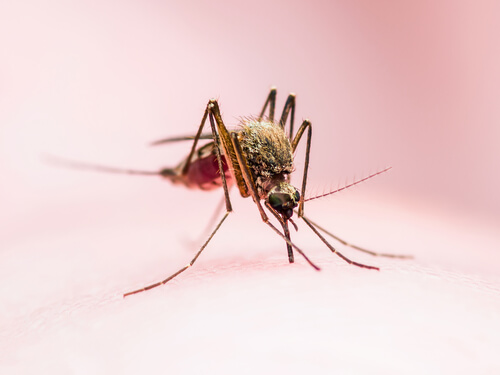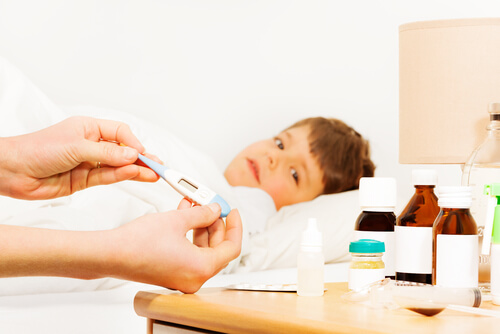Yellow Fever: Cause, Symptoms and Prevention

After the mosquito bite takes places, there is an incubation period of between 3 and 6 days before symptoms appear. Not all mosquitos carry the virus – only those that have bitten an infected individual.
The name of the illness refers to the yellow skin tone of those who are infected by the virus. The black plague and the American plague are alternative names for this same illness.
A vaccine does exist against yellow fever. However, it’s important to seek up-to-date information regarding the virus’s evolution in order to take appropriate measures.

How can I know if someone in my family has yellow fever?
After the mosquito bite occurs and the incubation period passes, the individual will present the symptoms of yellow fever. Below is a list of some of the typical symptoms:
- Fever.
- Headache.
- Dizzyness.
- Convulsions.
- Conjunctivitis.
- Overall discomfort.
- Liver malfunction.
- Lower back pain.
- Hemorrhage in different parts of the body.
- Arrhythmias, cardiac problems.
- Death, if the person doesn’t receive medical treatment in time.
Is yellow fever preventable?
Prevention of yellow fever involves avoiding mosquito bites while visiting areas where yellow fever is a risk. We suggest the following means of protection:
- Use mosquito netting and air conditioning.
- Use clothing that covers your entire body.
- If you travel to areas where yellow fever is an epidemic, use long-lasting insect repellents.
- Avoid using perfumes, as these may attract mosquitos.
- Lastly, the most effective means of prevention is the yellow fever vaccine. The vaccine consists of a single dosage that is good for 10 years.
Does everyone need the yellow fever vaccine?
No. Only those between 9 months and 59 years years of age. People who plan to travel to a region where yellow fever is present and those who travel outside the country should be vaccinated.
Children under 6 months of age and adults over 60 should not be vaccinated.
Furthermore, patients with HIV can get the vaccine, but it’s less effective. As for pregnant women, if they’re vaccinated during pregnancy, the baby will also be protected against the virus at birth.
People who are allergic to egg, chicken protein and gelatin cannot receive the yellow fever vaccine. This is because one of the components of the vaccine is chicken embryo.
Once you’re vaccinated, you’ll receive certification. It’s important that you save this paper and carry it with you when you travel out of the country or to affected areas.

Possible side effects of the yellow fever vaccine
Like any other vaccine, the vaccine against yellow fever can produce serious reactions. These include muscle soreness, low grade fever, difficulty breathing, and rash.
If you or a family member develop an adverse reaction, call your doctor immediately. The same is true, of course, if you suspect yellow fever.
In either case, you should also seek urgent medical attention. Describe the symptoms to your doctor and let him or her know what day and time the vaccine was administered.
Now that you have more information about yellow fever, be sure to take measures to avoid infection. This is especially true if you travel to an area where there are already cases of yellow fever and there are lots of mosquitos.
Be particularly careful with children, as they are more prone to being bitten by this type of mosquito.
After the mosquito bite takes places, there is an incubation period of between 3 and 6 days before symptoms appear. Not all mosquitos carry the virus – only those that have bitten an infected individual.
The name of the illness refers to the yellow skin tone of those who are infected by the virus. The black plague and the American plague are alternative names for this same illness.
A vaccine does exist against yellow fever. However, it’s important to seek up-to-date information regarding the virus’s evolution in order to take appropriate measures.

How can I know if someone in my family has yellow fever?
After the mosquito bite occurs and the incubation period passes, the individual will present the symptoms of yellow fever. Below is a list of some of the typical symptoms:
- Fever.
- Headache.
- Dizzyness.
- Convulsions.
- Conjunctivitis.
- Overall discomfort.
- Liver malfunction.
- Lower back pain.
- Hemorrhage in different parts of the body.
- Arrhythmias, cardiac problems.
- Death, if the person doesn’t receive medical treatment in time.
Is yellow fever preventable?
Prevention of yellow fever involves avoiding mosquito bites while visiting areas where yellow fever is a risk. We suggest the following means of protection:
- Use mosquito netting and air conditioning.
- Use clothing that covers your entire body.
- If you travel to areas where yellow fever is an epidemic, use long-lasting insect repellents.
- Avoid using perfumes, as these may attract mosquitos.
- Lastly, the most effective means of prevention is the yellow fever vaccine. The vaccine consists of a single dosage that is good for 10 years.
Does everyone need the yellow fever vaccine?
No. Only those between 9 months and 59 years years of age. People who plan to travel to a region where yellow fever is present and those who travel outside the country should be vaccinated.
Children under 6 months of age and adults over 60 should not be vaccinated.
Furthermore, patients with HIV can get the vaccine, but it’s less effective. As for pregnant women, if they’re vaccinated during pregnancy, the baby will also be protected against the virus at birth.
People who are allergic to egg, chicken protein and gelatin cannot receive the yellow fever vaccine. This is because one of the components of the vaccine is chicken embryo.
Once you’re vaccinated, you’ll receive certification. It’s important that you save this paper and carry it with you when you travel out of the country or to affected areas.

Possible side effects of the yellow fever vaccine
Like any other vaccine, the vaccine against yellow fever can produce serious reactions. These include muscle soreness, low grade fever, difficulty breathing, and rash.
If you or a family member develop an adverse reaction, call your doctor immediately. The same is true, of course, if you suspect yellow fever.
In either case, you should also seek urgent medical attention. Describe the symptoms to your doctor and let him or her know what day and time the vaccine was administered.
Now that you have more information about yellow fever, be sure to take measures to avoid infection. This is especially true if you travel to an area where there are already cases of yellow fever and there are lots of mosquitos.
Be particularly careful with children, as they are more prone to being bitten by this type of mosquito.
All cited sources were thoroughly reviewed by our team to ensure their quality, reliability, currency, and validity. The bibliography of this article was considered reliable and of academic or scientific accuracy.
- Nóbrega Litvoc, Marcelo & Terra Gallafrio Novaes, Christina & Lopes, Max Igor. (2018). Yellow fever. Revista da Associação Médica Brasileira. 64. 106-113. 10.1590/1806-9282.64.02.106.
- Fiebre amarilla. Comité de enfermedades emergentes. Rev Chil Infect (2001); 18 (1): 64-68.
This text is provided for informational purposes only and does not replace consultation with a professional. If in doubt, consult your specialist.








